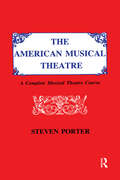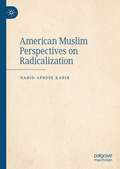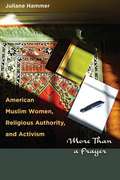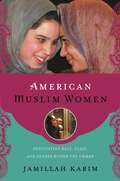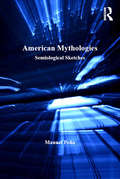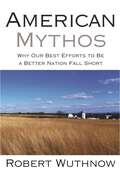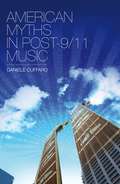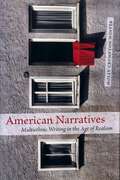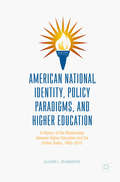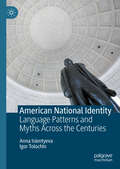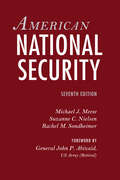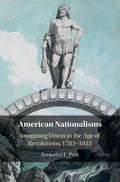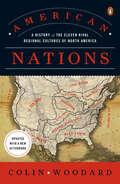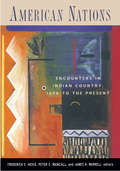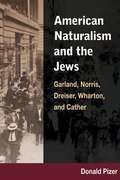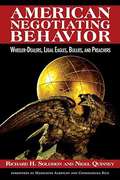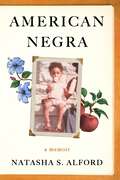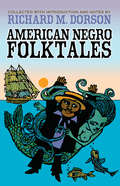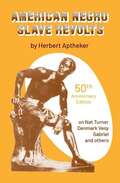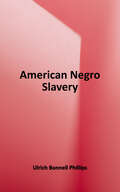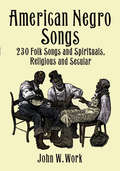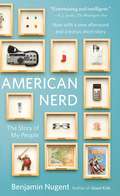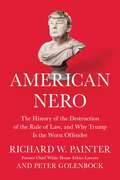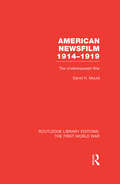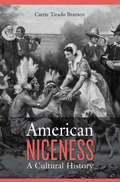- Table View
- List View
American Musical Theatre
by Steven PorterFirst Published in 1987. Split into four parts, this book seeks to inform the reader, teachers, directors and students about American Musical Theatre. Part I is a brief history of the American Musical Theatre, for it is only in the context of history that the material on which you work can be fully judged and mastered. Part II is a brief discussion of the elements of production. Knowing what ought to take place in a well-planned show can go a long way toward counteracting what does not take place in a poorly planned one. Part III is a brief discussion of how to evaluate the elements of craftmanship one expects to find in the writing and performing of a musical. The knowledge here is indispensable to the performer. It is the feel of the plane to the pilot, the touch of the key to the pianist. It is, in fact, the very life blood of the art form. Finally, Part IV provides an opportunity to put into practice what previous study has taught.
American Muslim Perspectives on Radicalization
by Nahid Afrose KabirThis book is a study of American Muslims' perspectives on Muslims who become radicalized and choose to support the Islamic State. Muslim radicalization is a global phenomenon that has affected American Muslims as it has Muslims throughout the world. In 2015, approximately 250 Americans joined the Islamic State (IS), and some still sympathize with it. Based on 51 in-depth interviews conducted in nine states from 2017 to 2021, this book offers a thematic understanding of radicalization, touching on themes such as Islamic history, Muslims' social and political identities, cultural dilemmas, radicalization outlets, mental health, media stereotypes, Islamophobia, security, and the impact of COVID-19 on radicalization. This book differs from previous scholarship on the causes of radicalization by focusing on the perspectives of non-radicalized American Muslims. While some previous scholarship has focused on Muslim radicalization in Europe, this book provides a new spectrum of views from the United States. It also offers pathways to de-radicalization. The interview data is complemented with relevant literature, analysis of media perspectives, and the author's personal observations.
American Muslim Women, Religious Authority, and Activism: More Than a Prayer
by Juliane HammerFollowing the events of September 11, 2001, American Muslims found themselves under unprecedented scrutiny. Muslim communities in the United States suffered from negative representations of their religion, but they also experienced increased interest in aspects of their faith and cultures. They seized the opportunity to shape the intellectual contribution of American Muslims to contemporary Muslim thought as never before. Muslim women in particular-often assumed to be silenced, oppressed members of their own communities-challenged stereotypes through their writing, seeking to express what it means to be a Muslim woman in America and carrying out intra-Muslim debates about gender roles and women's participation in society. Hammer looks at the work of significant female American Muslim writers, scholars, and activists, using their writings as a lens for a larger discussion of Muslim intellectual production in America and beyond. Centered on the controversial women-led Friday prayer in March 2005, Hammer uses this event and its aftermath to address themes of faith, community, and public opinion. Tracing the writings of American Muslim women since 1990, the author covers an extensive list of authors, including Amina Wadud, Leila Ahmed, Asma Barlas, Riffat Hassan, Mohja Kahf, Azizah al-Hibri, Asra Normani, and Asma Gull Hasan. Hammer deftly examines each author's writings, demonstrating that the debates that concern American Muslim women are at the heart of modern Muslim debates worldwide. While gender is the catalyst for Hammer's study, her examination of these women's intellectual output touches on themes central to contemporary Islam: authority, tradition, Islamic law, justice, and authenticity.
American Muslim Women: Negotiating Race, Class, and Gender within the Ummah (Religion, Race, and Ethnicity)
by Jamillah KarimAfrican American Muslims and South Asian Muslim immigrants are two of the largest ethnic Muslim groups in the U.S. Yet there are few sites in which African Americans and South Asian immigrants come together, and South Asians are often held up as a “model minority” against African Americans. However, the American ummah, or American Muslim community, stands as a unique site for interethnic solidarity in a time of increased tensions between native-born Americans and immigrants.This ethnographic study of African American and South Asian immigrant Muslims in Chicago and Atlanta explores how Islamic ideals of racial harmony and equality create hopeful possibilities in an American society that remains challenged by race and class inequalities. The volume focuses on women who, due to gender inequalities, are sometimes more likely to move outside of their ethnic Muslim spaces and interact with other Muslim ethnic groups in search of gender justice.American Muslim Women explores the relationships and sometimes alliances between African Americans and South Asian immigrants, drawing on interviews with a diverse group of women from these two communities. Karim investigates what it means to negotiate religious sisterhood against America's race and class hierarchies, and how those in the American Muslim community both construct and cross ethnic boundaries.American Muslim Women reveals the ways in which multiple forms of identity frame the American Muslim experience, in some moments reinforcing ethnic boundaries, and at other times, resisting them.
American Mythologies: Semiological Sketches
by Manuel PeñaAmerican Mythologies examines eleven myths that form part of the storehouse of present-day American mythologies, elucidating the nature of contemporary myths by investigating their ideological sub-terrain. Grounded in a semiological approach, which explores the displacement of information and the transformation of signs that characterise mythic communication, this book sheds light on the socio-economic, gendered, national and racial interests that lie behind myth-making. Presenting rich case studies from popular culture and public discourse, it demonstrates the manner in which these myths, and American mythology in general, promote the core values of everyday life under capitalism: rugged individualism, the unfettered right to accumulate wealth, the superior moral character of free-enterprise democracy, and its abundant opportunities for every citizen. By the same token, that same mythology negates the corruption endemic to the capitalist social order, an order that also promotes inescapable class, racial, and gender inequalities which confine the majority of Americans to a life of constant economic struggle. A fresh critique of the foundations of American culture, American Mythologies will appeal to those with interests in sociology, social and cultural theory, and cultural and media studies.
American Mythos: Why Our Best Efforts to Be a Better Nation Fall Short
by Robert WuthnowAmerica was built on stories: tales of grateful immigrants arriving at Ellis Island, Horatio Alger-style transformations, self-made men, and the Protestant work ethic. In this new book, renowned sociologist Robert Wuthnow examines these most American of stories--narratives about individualism, immigration, success, religion, and ethnicity--through the eyes of recent immigrants. In doing so, he demonstrates how the "American mythos" has both legitimized American society and prevented it from fully realizing its ideals. This magisterial work is a reflection and meditation on the national consciousness. It details how Americans have traditionally relied on narratives to address what it means to be strong, morally responsible individuals and to explain why some people are more successful than others--in short, to help us make sense of our lives. But it argues that these narratives have done little to help us confront new challenges. We pass laws to end racial discrimination, yet lack the resolve to create a more equitable society. We welcome the idea of pluralism in religion and values, yet we are shaken by the difficulties immigration presents. We champion prosperity for all, but live in a country where families are still homeless. American Mythos aptly documents this disconnect between the stories we tell and the reality we face. Examining how cultural narratives may not, and often do not, reflect the reality of today's society, it challenges readers to become more reflective about what it means to live up to the American ideal.
American Myths in Post-9/11 Music
by Daniele CuffaroAfter September 11, 2001, the void left following the attack on the Twin Towers in the heart of New York was the visible symbol that there was to be a breaking point with the past. The attacks dramatically changed the everyday lives of the American people and the new devastating landscape led people to seek to restore the certainties that had been so suddenly shattered. In doing this, Americans went back to the historical myths in their culture. This book explores the collective memory and historical American myths like, for example, the myth of the innocent nation and the frontier myth, and shows how some of these nationally considered historical truths have not disappeared, but were indeed exhumed in the music produced post-9/11.
American Narratives: Multiethnic Writing in the Age of Realism
by Margaret Crumpton WinterAmerican Narratives takes readers back to the turn of the twentieth century to reintroduce four writers of varying ethnic backgrounds whose works were mostly ignored by critics of their day. With the skill of a literary detective, Molly Crumpton Winter recovers an early multicultural discourse on assimilation and national belonging that has been largely overlooked by literary scholars. At the heart of the book are close readings of works by four nearly forgotten artists from 1890 to 1915, the era often termed the age of realism: Mary Antin, a Jewish American immigrant from Russia; Zitkala- a, a Sioux woman originally from South Dakota; Sutton E. Griggs, an African American from the South; and Sui Sin Far, a biracial, Chinese American female writer who lived on the West Coast. Winter's treatment of Antin's The Promised Land serves as an occasion for a reexamination of the concept of assimilation in American literature, and the chapter on Zitkala- a is the most comprehensive analysis of her narratives to date. Winter argues persuasively that Griggs should have long been a more visible presence in American literary history, and the exploration of Sui Sin Far reveals her to be the embodiment of the varied and unpredictable ways that diversity of cultures came together in America.In American Narratives, Winter maintains that the writings of these four rediscovered authors, with their emphasis on issues of ethnicity, identity, and nationality, fit squarely in the American realist tradition. She also establishes a multiethnic dialogue among these writers, demonstrating ways in which cultural identity and national belonging are peristently contested in this literature.
American National Identity, Policy Paradigms, and Higher Education: A History of the Relationship between Higher Education and the United States, 1862–2015
by Allison L. PalmadessaThis volume examines the role of higher education in producing and reproducing American cultural identity from 1862 to 2015 and considers whether changes in federal policy regarding higher education result in paradigm shifts that directly impact the purpose of higher education. American institutions of higher education have served as a beacon of American idealism and identity since the foundation of the earliest universities. As the nation developed, higher education matured and maintained a position of importance in the future of the nation. While the university has perpetuated American national cultural identity, the nation-state has resourced and legitimated the university, inextricably linking national identity and higher education. In this historical analysis, the relationship between national identity, federal legislation, and higher education is established, and an identity of superiority, defined in economic terms, reinforced by higher education, is revealed.
American National Identity: Language Patterns and Myths Across the Centuries
by Anna Islentyeva Igor TolochinThis book offers an analytical tool for identifying and analysing the linguistic mechanisms that shape American national identity in public discourses. Drawing on methods from (critical) discourse analysis and corpus linguistics, the authors provide insights into various levels of discourse structures, consider the social and political climate of the US at different stages of its history, trace the diachronic development of the linguistic patterns that shape the American national identity, and conduct a thorough discursive analysis of seminal texts such as The Declaration of Independence and the Preamble to the US Constitution. This book defines the key linguistic markers of the American national identity and provides an insight into how these markers are used to promote various ideologies in the pluralistic world of the contemporary USA. This monograph will be of interest to students and scholars working in fields such as Applied Linguistics, (Critical) Discourse Studies, Cultural Studies, US History and Politics.
American National Security
by Michael J. Meese Suzanne C. Nielsen Rachel M. SondheimerThis classic text provides a rich and nuanced discussion of American national security policymaking.American National Security remains the ideal foundational text for courses in national security, foreign policy, and security studies. Every chapter in this edition has been extensively revised, and the book includes discussion of recent security policy changes in the Trump administration. Highlights include:• An updated look at national security threats, military operations, and homeland security challenges • An analysis of the evolving roles of the president, Congress, the intelligence community, the military, and other institutions involved in national security• A revised consideration of the strengths, limitations, and employment of instruments of national power, including diplomacy, information, economic tools, and armed forces• An exploration of the economic and national security implications of globalization• An enhanced examination of the proliferation of transnational threats, including security challenges in space and in cyberspace• A new assessment of how international, political, and economic trends may change US leadership of the post–World War II international order• A comprehensive update on changing dynamics in key states and regions, including Russia, China, East Asia, the Middle East, South Asia, Europe, Sub-Saharan Africa, and Latin AmericaAn authoritative book that explains US national security policy, actors, and processes in a wide-ranging yet understandable way, American National Security addresses key issues, including challenges to the free and open international order, the reemergence of strategic competition among great powers, terrorism, economic and fiscal constraints, and rapid advances in information and technology.
American Nationalisms
by Benjamin E. ParkAmerica was born in an age of political revolution throughout the Atlantic world, a period when the very definition of 'nation' was transforming. Benjamin E. Park traces how Americans imagined novel forms of nationality during the country's first five decades within the context of European discussions taking place at the same time. Focusing on three case studies - Massachusetts, Pennsylvania, and South Carolina - Park examines the developing practices of nationalism in three specific contexts. He argues for a more elastic connection between nationalism and the nation-state by demonstrating that ideas concerning political and cultural allegiance to a federal body developed in different ways and at different rates throughout the nation. American Nationalisms explores how ideas of nationality permeated political disputes, religious revivals, patriotic festivals, slavery debates, and even literature.
American Nations: A History of the Eleven Rival Regional Cultures of North America
by Colin WoodardAn illuminating history of North America's eleven rival cultural regions that explodes the red state-blue state myth.North America was settled by people with distinct religious, political, and ethnographic characteristics, creating regional cultures that have been at odds with one another ever since. Subsequent immigrants didn't confront or assimilate into an "American" or "Canadian" culture, but rather into one of the eleven distinct regional ones that spread over the continent each staking out mutually exclusive territory.In American Nations, Colin Woodard leads us on a journey through the history of our fractured continent, and the rivalries and alliances between its component nations, which conform to neither state nor international boundaries. He illustrates and explains why "American" values vary sharply from one region to another. Woodard (author of American Character: A History of the Epic Struggle Between Individual Liberty and the Common Good) reveals how intranational differences have played a pivotal role at every point in the continent's history, from the American Revolution and the Civil War to the tumultuous sixties and the "blue county/red county" maps of recent presidential elections. American Nations is a revolutionary and revelatory take on America's myriad identities and how the conflicts between them have shaped our past and are molding our future.From the Hardcover edition.
American Nations: Encounters in Indian Country, 1850 to the Present
by Frederick E. HoxieThis volume brings together an impressive collection of important works covering nearly every aspect of early Native American history, from contact and exchange to diplomacy, religion, warfare, and disease.
American Naturalism and the Jews: Garland, Norris, Dreiser, Wharton, and Cather
by Donald PizerAmerican Naturalism and the Jews examines the unabashed anti-Semitism of five notable American naturalist novelists otherwise known for their progressive social values. Hamlin Garland, Frank Norris, and Theodore Dreiser all pushed for social improvements for the poor and oppressed, while Edith Wharton and Willa Cather both advanced the public status of women. But they all also expressed strong prejudices against the Jewish race and faith throughout their fiction, essays, letters, and other writings, producing a contradiction in American literary history that has stymied scholars and, until now, gone largely unexamined. In this breakthrough study, Donald Pizer confronts this disconcerting strain of anti-Semitism pervading American letters and culture, illustrating how easily prejudice can coexist with even the most progressive ideals. Pizer shows how these writers' racist impulses represented more than just personal biases, but resonated with larger social and ideological movements within American culture. Anti-Semitic sentiment motivated such various movements as the western farmers' populist revolt and the East Coast patricians' revulsion against immigration, both of which Pizer discusses here. This antagonism toward Jews and other non-Anglo-Saxon ethnicities intersected not only with these authors' social reform agendas but also with their literary method of representing the overpowering forces of heredity, social or natural environment, and savage instinct.
American Negotiating Behavior: Wheeler-Dealers, Legal Eagles, Bullies, and Preachers
by Madeleine Albright Condoleezza Rice Richard H. Solomon Nigel QuinneyThis landmark study offers a rich and detailed portrait of the negotiating practices of American officials. It assesses the multiple influences cultural, institutional, historical, and political that shape how American policymakers and diplomats approach negotiations with foreign counterparts and highlights behavioral patterns that transcend the actions of individual negotiators and administrations. <P><P>Informed by discussions and interviews with more than fifty seasoned foreign and American negotiators, Richard H. Solomon and Nigel Quinney argue that four distinctive mind-sets have combined to shape U.S. negotiating practice: a businessperson s pragmatic quest for concrete results, a lawyer s attention to detail, a superpower s inclination to dictate terms, and a moralizer s sense of mission. The authors examine how Americans employ time, language, enticements, and pressure tactics at the negotiating table, and how they use (or neglect) the media, back channel communications, and hospitality outside the formal negotiating arena. They also explore the intense interagency rivalries and congressional second-guessing that limit U.S. negotiators freedom to maneuver.A chapter by the eminent historian Robert Schulzinger charts the evolving relationship between U.S. presidents and their negotiators, and the volume presents a set of eight remarkably candid foreign perspectives on particular aspects of American negotiating behavior. These chapters are written by a distinguished cast of ambassadors and foreign ministers, some from countries allied to the United States, others from rivals or adversaries and all with illuminating stories to tell.In the concluding chapter, Solomon and Quinney propose a variety of measures to enhance America s negotiating capacities to deal with the new and emerging challenges to effective diplomacy in the 21st century. <P><P>Contributors: Gilles Andreani Chan Heng Chee David Hannay Faruk Logoglu Lalit Mansingh Yuri Nazarkin Robert Schulzinger Koji Watanabe John Wood"
American Negra: A Memoir
by Natasha S. AlfordAward-winning journalist Natasha S. Alford grew up between two worlds as the daughter of an African American father and Puerto Rican mother. In American Negra, a narrative that is part memoir, part cultural analysis, Alford reflects on growing up in a working-class family from the city of Syracuse, NY.In smart, vivid prose, Alford illustrates the complexity of being multiethnic in Upstate New York and society’s flawed teachings about matters of identity. When she travels to Puerto Rico for the first time, she is the darkest in her family, and navigates shame for not speaking Spanish fluently. She visits African-American hair salons where she’s told that she has “good” hair, while internalizing images that as a Latina she has "bad” hair or pelo malo.When Alford goes from an underfunded public school system to Harvard University surrounded by privilege and pedigree, she wrestles with more than her own ethnic identity, as she is faced with imposter syndrome, a shocking medical diagnosis, and a struggle to define success on her own terms. A study abroad trip to the Dominican Republic changes her perspective on Afro-Latinidad and sets her on a path to better understand her own Latin roots.Alford then embarks on a whirlwind journey to find her authentic voice, taking her across the United States from a hedge fund boardroom to a classroom and ultimately a newsroom, as a journalist. A coming-of-age story about what it's like to live at the intersections of race, culture, gender, and class, all while staying true to yourself, American Negra is a captivating look at one woman’s experience being Negra in the United States. As the movement to highlight Afro-Latin identity and overlooked histories of the African diaspora grows, American Negra illustrates the diversity of the Black experience in the larger fabric of American society.
American Negro Folktales
by Richard M. DorsonA preacher battles a bear, a mother returns from the dead, and a clever servant conducts a Big Feet Contest in this rich anthology of African-American folklore. Scores of humorous and harrowing stories, collected during the mid-twentieth century, tell of talking animals, ghosts, devils, and saints.The first part of the book provides a setting for the fables, in which folklorist Richard M. Dorson discusses their origins and the artistry of storytellers. The second part consists of the tales, which include the adventures of Old Marster and John, supernatural episodes, and comical and satirical anecdotes as well as more realistic accounts of racial injustice. Recounted in the actual words of the narrators, the folktales abound in bold language, memorable imagery, and bittersweet humor that reflect the essence of African-American storytelling traditions.
American Negro Slave Revolts
by Herbert ApthekerYears ago, the controlling view held that the response of the slaves in the United States to their bondage "was one of passivity and docility". That opinion, so decisive a part of the chauvinism afflicting the nation, is shown to be false in this book and in the material accumulated since its initial appearance has further substantiated this thesis; namely, that the African-American people, in slavery, forged a record of discontent and of resistance comparable to that marking the history of any other oppressed people.
American Negro Slavery: A Survey of the Supply, Employment, and Control of Negro Labor as Determined by the Plantation Regime
by Ulrich Bonnell PhillipsOriginally published in 1918, Ulrich Bonnell Phillips?s American Negro Slavery was widely hailed upon publication as the most comprehensive and accurate examination of enslaved Africans in the South by an academic historian. In the 1950s, however, a new generation of historians?led by Kenneth Stamp?challenged many of Phillips?s inaccurate and racist views about slavery. While many historians today acknowledge that American Negro Slavery is a pioneering work, most agree that Phillips?s misunderstandings, misinterpretations, and overt racism profoundly diminish his conclusions. This 1966 edition includes a foreword by Eugene D. Genovese, author of numerous academic works on slavery, including the Bancroft Prize-winning Roll, Jordan, Roll: The World the Slaves Made (1974).
American Negro Songs: 230 Folk Songs and Spirituals, Religious and Secular
by John W. WorkFrom joyous gospel to deeply felt blues, this wonderful collection contains vintage songs sung and played through the years by black Americans — at work, in church, and for pure entertainment. Included are spirituals, blues, work songs, and a variety of social and dance songs.This important volume was originally compiled in 1940 by Dr. John W. Work, the noted musicologist affiliated with Fisk University and the celebrated Fisk Jubilee Singers. In it, he discusses the origins and history of black American folk music, the influence of slavery and African cultures, and the lyric significance of such much-loved songs as "Swing Low, Sweet Chariot," Steal Away to Jesus," "Lord, I Want to Be a Christian," and "John Henry." These informative notes lead up to the heart of the book: the complete words and music for 230 religious and secular songs, including "Study War No More," "Keep Me from Sinking Down," "You May Bury Me in the East," "Rock of Ages," "Go Tell It on the Mountain," and many others.This is an indispensable treasury of music for singers, musicians and all readers seeking a comprehensive sourcebook of black American folk music. It will be equally welcomed at parties, family get-togethers, sing-alongs, church events, and other gatherings where people want to play and sing these classic folk songs that are an integral part of American musical history.
American Nerd: The Story of My People
by Benjamin NugentMost people know a nerd when they see one but can't define just what a nerd is. American Nerd: The Story of My People gives us the history of the concept of nerdiness and of the subcultures we consider nerdy. What makes Dr. Frankenstein the archetypal nerd? Where did the modern jock come from? When and how did being a self-described nerd become trendy? As the nerd emerged, vaguely formed, in the nineteenth century, and popped up again and again in college humor journals and sketch comedy, our culture obsessed over the designation. Mixing research and reportage with autobiography, critically acclaimed writer Benjamin Nugent embarks on a fact-finding mission of the most entertaining variety. He seeks the best definition of nerd and illuminates the common ground between nerd subcultures that might seem unrelated: high-school debate team kids and ham radio enthusiasts, medieval reenactors and pro-circuit Halo players. Why do the same people who like to work with computers also enjoy playing Dungeons & Dragons? How are those activities similar? This clever, enlightening book will appeal to the nerd (and antinerd) that lives inside all of us.
American Nero: The History of the Destruction of the Rule of Law, and Why Trump Is the Worst Offender
by Peter Golenbock Richard PainterDonald Trump is eroding the rule of law! We've heard it said many times, and we can feel it in our guts. But what does "rule of law" really mean? And what happens when it breaks down? From Richard Painter, a senate candidate and law professor who served as White House chief ethics counsel under President George W. Bush, and New York Times bestselling author Peter Golenbock, American Nero is an in-depth exploration the rule of law—the legal bedrock on which this country was founded. Painter and Golenbock present a clear description of rule of law—arguably the single most important principle underlying our civilization. They also describe the abuses of power that have occurred throughout our nation's history. Beginning in Puritan New England with the infamous Salem Witch Trials, American Nero makes vivid stops at The Red Scare of the 1920s, Japanese-American internment, the McCarthy Era, and, much more recently, President Trump's attempt to violate the First Amendment by banning Muslims from entering the US. While Trump is not the first offender, he is arguably the most blatant, and this unflinchingly honest and insightful work presents in devastating detail the ways in which our current president has trampled the rule of law with his attacks on the freedom of the press, the independence of the judiciary, and the autonomy of the justice department. This is not a book about right vs. left —instead, it is about the rule of law, a principle that transcends partisan politics, and how vital it is to the survival of our country. This book serves as a call-to-action, looking ahead to a brighter future for our country, one where citizens and officials alike protect our rights and honor their responsibilities. Timely and revealing, American Nero shares the lessons of history and lays the framework for returning to a society that respects the rule of law—an America that is consistent with our Founding Fathers' vision of a genuinely free nation.
American Newsfilm 1914-1919: The Underexposed War (Routledge Library Editions: The First World War)
by David H. MouldThe First World War was the first conflict in which film became a significant instrument of propaganda. For the United States, the war had two distinct phases: from August 1914 to April 1917, America was officially a neutral country; after April 1917 the United States was in the war, providing men, money and munitions for the Allies. These two phases are mirrored in the newsreels and documentary films shown in the United States. This volume starts by examining the background to the war for the movie industry – the coverage of previous conflicts and the growth of the newsreel. It examines the experiences of American cameramen who worked in the war zone: their efforts to gain access to the front, to overcome problems ranging from unreliable equipment to poor lighting conditions to evading censorship and how this shaped the coverage of the war.
American Niceness: A Cultural History
by Carrie Tirado BramenThe cliché of the Ugly American—loud, vulgar, materialistic, chauvinistic—still expresses what people around the world dislike about their Yankee counterparts. Carrie Tirado Bramen recovers the history of a different national archetype—the nice American—which has been central to ideas of American identity since the nineteenth century.
